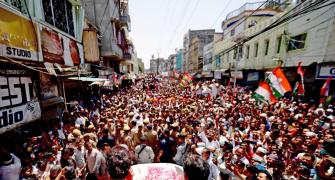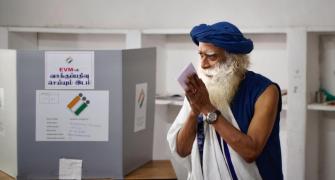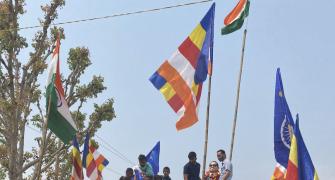India has completed the construction of the 218-km Zaranj-Delaram Highway in South-Western Afghanistan despite attacks by Taliban and the loss of precious lives of Indian nationals working on the project.
The prestigious highway that will connect India with Central Asia will be handed over to the Afghanistan government soon.
Prime Minister Manmohan Singh, who conveyed this to visiting Afghanistan President Hamid Karzai described the construction of the road as ''a major test of our joint resolve''.
Karzai is in India on a two-day State visit after attending the 15th SAARC Summit in Colombo. He held talks yesterday with the Prime Minister and other leaders.
"One of the important infrastructure projects in Western Afghanistan -- the road from Zaranj to Delaram--is now complete and will be handed over soon to the Government of Afghanistan. The construction of this road was a major test of our joint resolve,'' the Prime Minister said.
He described the road as a symbol of India-Afghanistan cooperation and a tribute to the precious Indian and Afghan lives that were lost in making this project a reality.
''The road has brought our two peoples closer together,'' Dr Singh said.
He said India's efforts for the reconstruction and development of Afghanistan were part of a larger international endeavour to help the Afghan people in forging a pluralistic and democratic society.
The highway, which has been constructed by the Border Roads Organisation (BRO) of the Indian Army, is in Nimroz province and Indian engineers have repeatedly been targeted by the Taliban.
Foreign Secretary Shivshankar Menon said recently that Taliban want India out of Afghanistan.
The Zaranj-Delaram road project had been under attack more than ten times. In November 2005, Ramankutty Maniyappan, a 36-year-old driver working with the BRO, was taken hostage and beheaded.
In 2003, two engineers working on a road project were abducted but later released. In January this year, a suicide attack on a BRO convoy resulted in the deaths of two personnel of the Indo-Tibetan Border Police, which is providing security to BRO personnel working on the highway.
About 50 Afghan security personnel lost their lives guarding Indian engineers and crew on this road project.
The Zaranj-Delaram Highway will link Zaranj, on Afghanistan's border, with Iran, Delaram and several other cities in Afghanistan on the 'Garland Highway'.
The highway will also connect Iran with the Garland Highway, which links Kabul, Kandahar, Mazar-e-Sharif Herat and Kunduz.
India hopes that the Highway will open up markets for its goods in Afghanistan and beyond in Central Asia and once the highway become operational, goods from Afghanistan's main cities can be brought overland to the border with Iran.
The Zaranj-Delaram highway will considerably reduce land-locked Afghanistan's dependence on Pakistan for trade with Iran and Central Asia. It will also reduce Pakistan's influence over Afghanistan and increase India's.
Although the project was scheduled to be completed by December 2006, it was delayed because of frequent Taliban attacks on Indian workers. The initial cost of the project which was about 70 million US Dollars, has almost doubled.
There was huge resistance to the work being done by the tribals along the drug-cultivation belt that flanked the highway in many places.
The poor security situation had compelled the BRO to work only for eight hours a day. Initially, the organisation worked on several stretches of road simultaneously, but after the killing of one of its workers in 2005, it was compelled to take up one stretch at a time to keep its workers together.
About 300 Indians were working for BRO on the Zaranj-Delaram project and were protected by ITBP.
However, ITBP personnel were not permitted to move beyond the living camps with weapons, so Afghan security personnel provided security at the work site.







